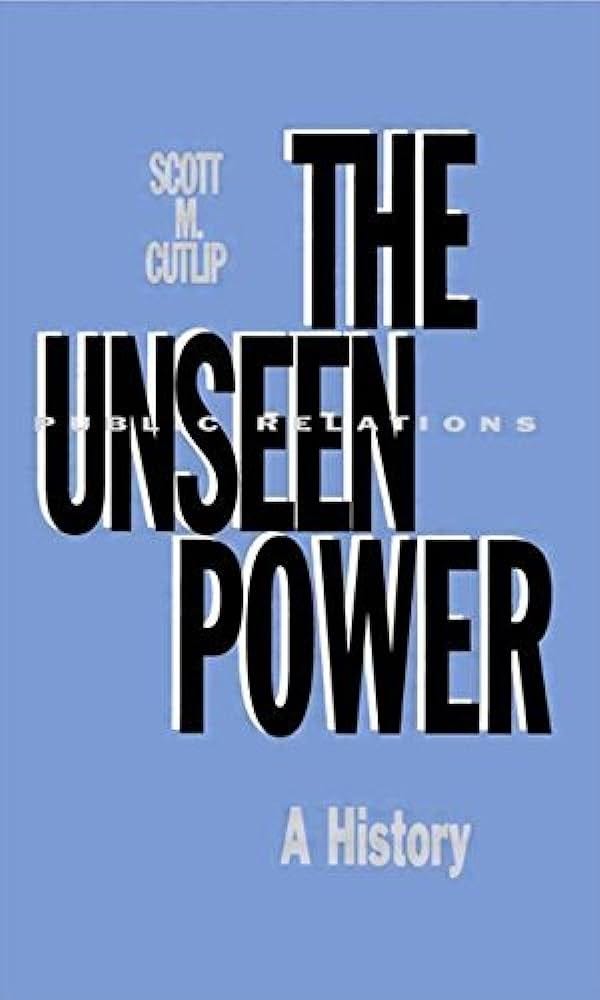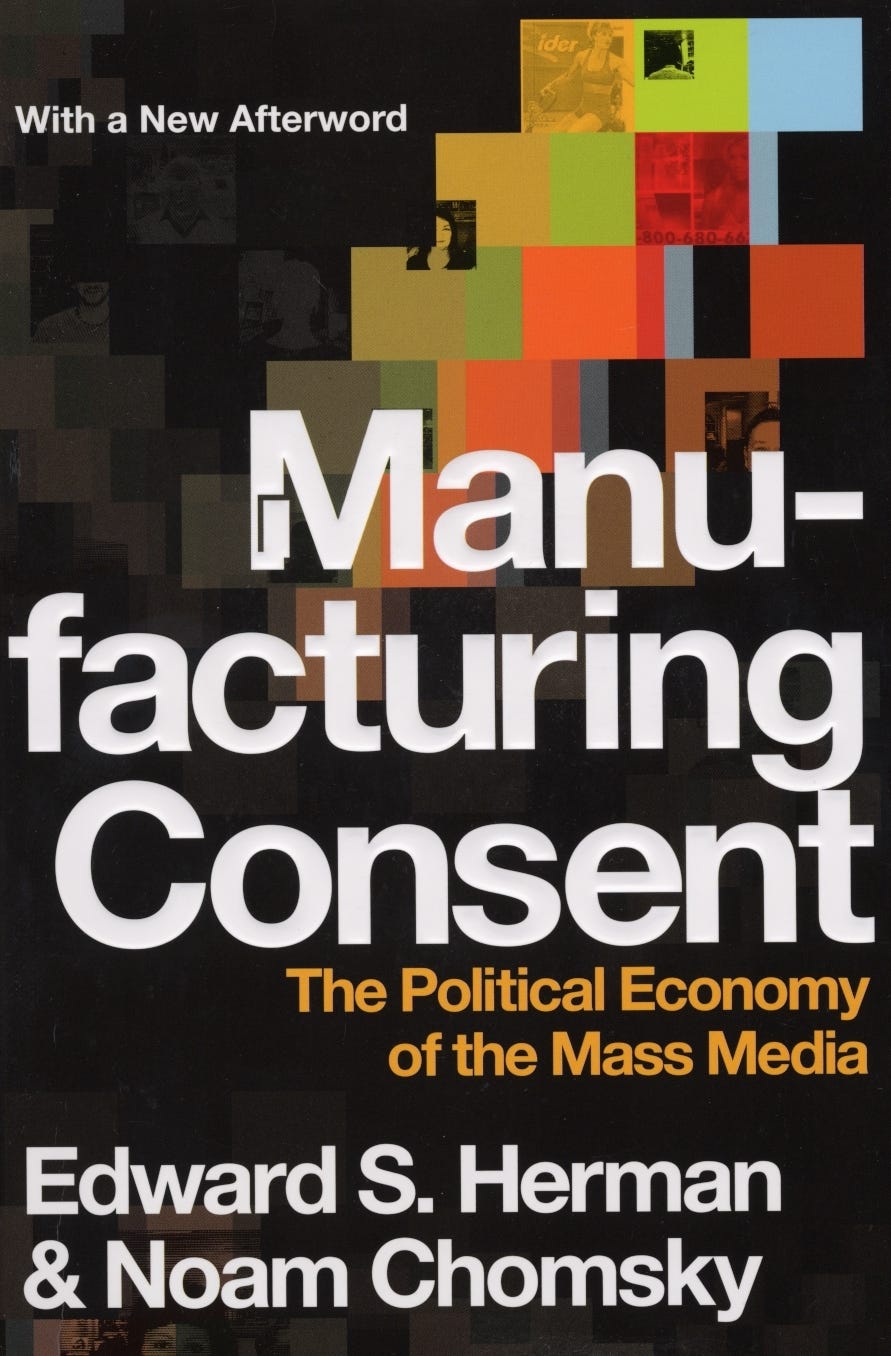Do words change minds? Hell yeah. Why do you think the PR industry got up and running? But weirdly, in my field of linguistics, this question is still up for debate, with even super famous linguists like Noam Chomsky arguing that language has nothing to do with the shaping of people’s minds. When asked about how he would describe the relationship between language and politics, ‘tenuous’ was the great professor’s answer1. But then Chomsky doesn’t even think language is connected to communication2. Apparently we mostly just need it for talking to ourselves in our own heads.
It’s curious, because Chomsky has lived through a big chunk of the 20th century, the crucible for the rise of professional public relations. The PR industry is entirely based on the idea that words - and their many accoutrements, like images, colour, font, music - shape and change people’s minds. While Chomsky was writing that language is for expressing the thoughts we already thought, PR professionals were busy for decades working out how to harnass the power of language to shape and change how we think and feel. They have always known that words are the means of putting ideas in people’s heads.
PR is big business. One survey puts the number of PR professionals in the US at 58, 000, and projects a value for the global industry by 2025 at nearly 130 billion dollars. A sizeable history of the profession, called The Unseen Power, by the first academic to start researching this industry links the rise of PR to the kind of US capitalism seen at the turn of the 20th century: ‘wild, frenzied and bold’ is how the pioneering PR academic Scott Cutlip describes this era.
This period, Cutlip continues, oversaw:
the rise of powerful monopolies, increasing concentration of wealth and power and the rough-shod tactics of the robber barons in exploiting human labor and the nation's resources.
Public relations was birthed in this era to protect the reputations and business interests of capitalists, including those building fossil fuel empires. Amy Westervelt’s ‘Mad Men of Climate Denial’ podcast series is a history of this fatal intersection of PR and fossil fuelery.
Climate journalist Amy Westervelt (CC license, Wikipedia)
Chomsky is famous for his writings on American imperialism and power - you’d think he’d notice the essential role of language in politics and power. He even wrote a pretty famous book about bias in the media, called Manufacturing Consent. But this work never, ever overlapped with his abstract linguistic theories. There’s not a single idea from my field in his work on how media shapes public opinion. Go figure.
How words change minds
Words are complex. From the outside they appear simply to name something that is already there. But as my Canadian linguistical BFF Prof Lise Fontaine once explained, words are like the TARDIS: they travel through time and space, and are bigger on the inside. They are changeable and malleable. They are hard to hold. As they move across time and space, they accumulate baggage which often means when you use them, you are saying things you aren’t even quite aware of. This is how covert ideologies are made and reproduced.
While some linguists built careers ignoring living breathing language, others understood its remarkable and empiric power. Benjamin Lee Whorf is one linguist I make my students read because he shows how language is essential to the way we know and make the realities we live in. Humans made language so that we can make sense of our experience. As it weaves its meanings, language creates the concepts and meanings that organize our minds. This is true even for what we think of as our most basic emotions. We wouldn’t know what it means to be happy, sad, excited, or amused, much less our deeper feelings like regret or nostalgia, without language. If you want a neuroscientist to explain this to you, check out Lisa Feldman Barrett’s TED talk, or her book How Emotions are Made: The Secret Life of the Brain.
From decades of research, Feldman Barrett shows that emotions are not built in, they are built, through language, experience and socialization. If even things like feeling happy are powered by the semiotic energy of language, we have before us a very daunting task: namely, understanding and undoing the language that keeps normalizing the burning of dirty fossil fuels. The many and varied communication strategies and tactics of fossil fuel corporations show how much they have understood about language, as well as the media ecologies through which they have been able to transmit their insidious, dirty fuel narratives. Here’s a link to a summary by an environmental scientist, Professor Geoffrey Supran, of how these corporations have managed American hearts and minds over the last few decades, while they knew the planetary damage their products were capable of.
While Chomsky was arguing that all you need to combat propaganda was ‘ordinary common sense’3, one of the masters of dirty fossil fuel propaganda, Herbert Schmertz, the vice president of Public Affairs at Mobil from 1969 to 1988 was able to explain something deeply important about how language works to interested PR professionals:
Be sensitive to semantic infiltration, the process whereby language does the dirty work of politics. Be sensitive to these word choices, and be competitive in how you use them. Your objective is to wrap yourself in the good phrases while sticking your opponents with the bad ones.
Good advice - a shame he worked for Big dirty Oil. The UN Chief Antonio Guterres has just called for a ban on dirty fossil fuels advertising - see this news at the Heated newsletter.
‘Clean energy’ versus ‘energy’
Here’s one of the good words that fossil fuel corporations cloak themselves in: ‘energy’. Pause a moment to try to give this word a definition. You may feel you already know this word intimately, but when you try to define it, you’ll see how hard the task is of pinning it down.
‘Energy’ operates in a range of our little worlds - from oil to chakras, and by ‘oil’ here I mean dirty fossil oil, not ‘essential’ oils. You can see the problem - word meanings are not simple. ‘Energy’ is imbued with positive connotations. In its Latin and Greek days, the word was associated with vigour, power and strength, no small performance-enhancer in a patriarchal world. No wonder fossil fuel companies started to name themselves 'energy' companies. Chevron used to boast it was 'one of the world's largest integrated petroleum companies', before moving over to calling itself 'the human energy company'.
This word is playing a complicated role in the discourse that is delaying climate action. I mentioned climate journalist Amy Westervelt earlier. When asked about how her podcast on the Mad Men of Climate Denial could help listeners understand the impact of fossil fuels business, Westervelt responded:
I think it’s important for people to understand how much a lot of the things that we take for granted about how the world works and how energy works and how the economy works are actually ideas that have been very intentionally placed there by industry folks who have a goal in mind, which is to keep doing what they’re doing and avoid regulation. It’s a for-profit industry.
Since we know from neuroscience that ‘happy’ is a construct, we shouldn’t now be surprised to see that ‘energy’ isn’t simply a word referring to something in the world. It’s got a hinterland of meanings around it which we have to understand to find a way to crack its ideological work. I’ve had this word on my ‘to do’ list for a while, and have noticed a couple of interesting things. The first thing I started to wonder about was the conjunction of ‘climate’ and ‘energy’. Australia has a minister for ‘Climate change and energy’, and one of Australia’s most prominent ‘climate denier super lobbyists’, the Minerals Council of Australia, has an Energy and Climate Change policy.
I know it seems obvious to put these words together. But as the British corpus linguist and lexicographer, Adam Kilgariff wrote, language is never, ever, ever random. And it’s the job of a linguist like me to treat these words like the TARDIS - bigger on the inside. So here’s something to think about: if we love to say ‘energy and climate’, what about ‘fossil fuels and climate’? Isn’t this the important conjunction of terms? Because its not all forms of energy that are impacting on climate, just those derived from burning fossil fuels.
I searched the Google Books Corpus (which has about 200 billion words of English) for the conjunction of ‘energy and climate’ (and the reverse of these terms). You can see in the screenshot below that while ‘climate and energy’ / ‘energy and climate’ have a measurable presence, ‘fossil fuels and climate’ barely rates a mention, and ‘climate and fossil fuels’ returns a ‘not found’ message. I also searched the News on the Web Corpus, 19 billion words of English news data from 2010 to yesterday across 20 countries, and the conjunction of ‘energy’ and ‘climate/change’ is more frequent than ‘fossil fuels’ and ‘climate’ by a factor of 33 to 1, and by 219 to 1 if the terms are reversed.
Here’s another way to see this problem: I searched three phrases in the News on the Web data, to get a feeling for how often you will hear ‘energy and climate’, versus ‘fossil fuels and climate’, versus ‘fossil fuels and global warming’. Your chance of hearing ‘energy and climate’ versus ‘fossil fuels and global warming’ is about 260 to 1, using news as our data source. So we are much more likely to have ‘energy and climate’ in our heads, then to have ‘fossil fuels and global warming’.
This matters. If the climate predators keeping fossil fuels going as long as possible want to take Schmertz’s advice, they need a fertile platform for their positive words. ‘Energy’ is a much softer platform for them, when compared with ‘fossil fuels’, and ‘climate’ is similarly much less edgy than ‘global warming’.
Thanks for reading this far: there’s one other point I want to make. We live in a world that has ‘energy’ and ‘clean energy’. We don’t yet have a concept of ‘dirty energy’. ‘Dirty energy’ is still just ‘energy’. Check out my search on the Google Books corpus below.
Here’s the parallel: we have ‘football’ and then we have ‘women’s football’. We have ‘nurses’ and then we have ‘male nurses’. We have default categories - default football is men’s football, so we don’t need to specify that it is the men’s game. The default nurse is female, so we only have to specify gender to indicate a male nurse. So ‘clean’ energy, like its synonyms ‘green energy’, ‘renewable’ and ‘alternative energy’, is the special case of energy. Instead of a world with ‘energy’ and ‘clean energy’, let’s imagine a world with ‘energy’ and ‘dirty energy’, a world where the special case is the forms of energy derived from burning dirty fossil fuels. We can build this world. What we need is a coalition of people committed to saying ‘dirty energy’ every time they get the chance. Language is contagious. Over time, with enough of us using this world, the scales will tip. That’s how language works.
Otero CP (2004) Noam Chomsky: language and politics, 2nd edn. A.K. Press, Edinburgh
Chomsky N (2012) The science of language: interviews with James McGilvray. Cambridge University Press, Cambridge
Otero CP (2004) Noam Chomsky: language and politics, 2nd edn. A.K. Press, Edinburgh












Maybe the word "sustainable" could be a good one to look at in the future. There is a UQ Sustainable Minerals Institute. The mission statement is a minefield haha
This is SO good. Thank you Annabelle.